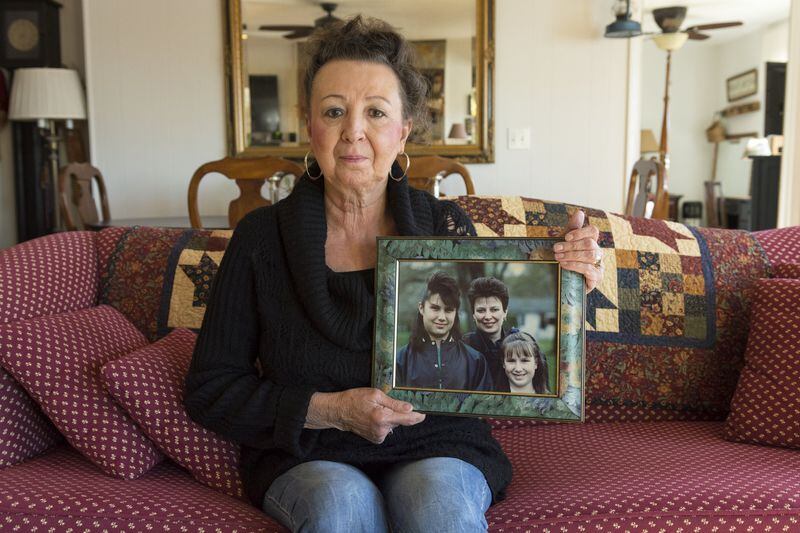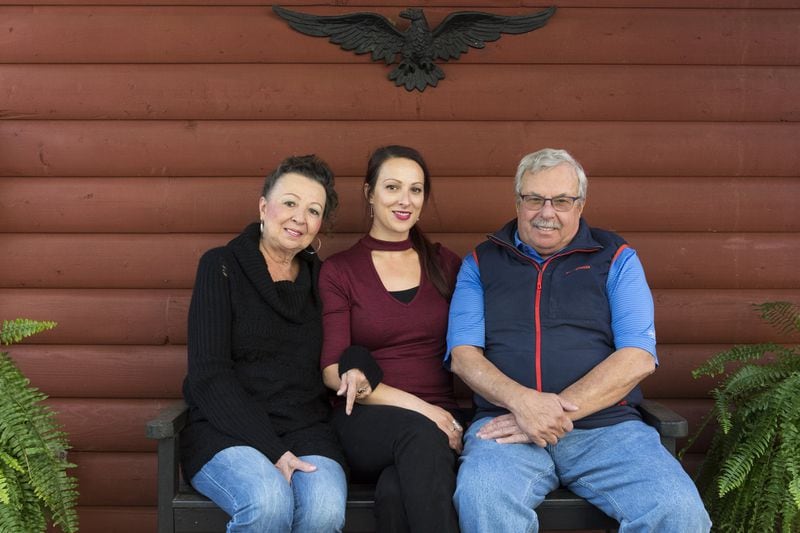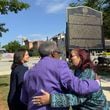Mary Bernier has said a lot of goodbyes over the years.
Twelve friends. Twelve funerals.
“We lost so many women,” said Bernier, a 67-year-old retired X-ray technician. “It didn’t seem like we were getting any closer to a cure. We didn’t have any options. People were still not making it. “
Today, she is the sole survivor of a small circle of 13 women with ovarian cancer.
It was not a group anyone wanted to join.
The price of membership was too high.
It meant you had ovarian cancer. It meant that you could die.
‘These women wanted to live’
Together, they were the original members of the Georgia Ovarian Cancer Alliance, formed 18 years ago to educate and raise awareness about the disease.
“All of these women were a gift,” said Bernier, who lives with her husband, Robert, in a lakeside home in Blairsville in North Georgia.
“When we were together, it was a celebration of life,” said Bernier, who inherited the BRCA1 gene, which increases the risk of breast or ovarian cancer in women, from her father. “Most importantly, it was that soul of a friend that was always ready to support you even when the news from the latest tests was not what you wanted to hear.”
The group included a political activist, a photographer, a teacher and a psychologist.
They initially met through a gynecological cancer support group at St. Joseph’s Hospital (now Emory St. Joseph’s Hospital) in Atlanta. The idea, though, for an organization focused on ovarian cancer was hatched at the dining room table of founder Virginia (Ginger) Ackerman, who, like the others, wanted to arm women and their families with information.
Ackerman, the 12th member to die, passed in 2010.
They cried together. They laughed together. They sat side by side and held hands during chemo.
They made sure that not a Christmas went by without a party.
Over the course of their friendship, the women were in various stages of fighting their cancer — from remission, to a second diagnosis to nearing death.
In a strange way, the sisterhood had a calming influence on Bernier, a mother of two and grandmother.
“I was very sick, but I could sit there with women who knew what I was going through. All of these women wanted to live. I know that.”
‘A pivotal role’ in group
Friend and Georgia Ovarian Cancer Alliance board member Marjorie Rosing, who lost her mother to ovarian cancer, calls Bernier “a fighter. She wasn’t going to let it beat her, although a lot of people had that same attitude. She just really persevered. She played a pivotal role in getting that group off the ground.”
Ovarian cancer is the fifth-leading cause of cancer deaths in women, according to the American Cancer Society. It's sometimes call the silent killer because its symptoms such as bloating, indigestion, nausea, fatigue, abdominal pain and a change in bowel habits are often misdiagnosed — or dismissed — as other ailments.
For that reason, it’s often not caught until it is in late stages.
It rarely gets the big-dollar donations as other cancer initiatives and certainly not the media attention of say lung or breast cancer, both of which affect many more people.
Comedian and actress Gilda Radner died of ovarian cancer, as did actress and singer Dinah Shore.
“We see the NFL wearing pink shoes,” said Robert Bernier. “We see all this pink (for breast cancer awareness). Where the hell is all the teal? We needed the money for sure. Breast cancer has made such great steps with early diagnosis.”
This year, for example, more than 22,200 women will be diagnosed with ovarian cancer. The American Cancer Society estimates 14,240 will die from the disease.
By comparison, the American Cancer Society predicts 246,660 new cases of invasive breast cancer will be diagnosed in women in 2016.
About 40,450 women will die from breast cancer.
“Mary has brought the awareness level to ‘You can beat this. You can survive this,’” said Doug Barron, executive director of the Georgia Ovarian Cancer Alliance. “She’s the matriarch of this organization. She has a purpose. It’s something about her spirit. She’ve very matter of fact: I have ovarian cancer. Now what do we do? She has gotten the words ovarian cancer spoken and then we go from there.”
Indeed, Bernier’s daughter Emily, who also has the BRCA1 gene, had a hysterectomy at 29.
A 50-50 chance of survival
Bernier was first diagnosed with ovarian cancer in 1994, but the disease had already robbed her of a loved one. Her younger sister, Kate, was diagnosed two years earlier at age 38 and died less than a year later. A niece also died of ovarian cancer.
Other relatives had been diagnosed with colon cancer or breast cancer.
In 1993, Bernier went in for her regular pap smear. There was no reason to suspect anything was wrong, and her results came back normal. What she didn’t know was that a woman could have a normal pap smear and still have ovarian cancer. The next year, she went for her annual exam, there was some bloating and back pain. She was tired, but shrugged it off as a result of starting a new job.
She could tell, though, that this time her doctor was concerned. She suggested that Bernier have a pelvic ultrasound and a CA 125 test, which measures the amount of a cancer antigen in the blood. In some cases, the test can detect early signs of ovarian cancer in women. At the time, it was a very expensive test and not considered a routine test. It had to be approved by an insurer.
Surgery was the next step. After surgery, it was determined that Bernier had stage 3 ovarian cancer. The oncologist told her she had a 50-50 chance of surviving.
“The worst thing was coming home and having to tell my family — my son, daughter, mother and father,” she said. “We had just lost my sister two years earlier.”
She started chemo and joined a clinical trial to test a new drug, but she had to drop out because the treatment made her sick.
Then she heard about a weekly support group for women like her. “I wanted to hear what other women had to say and nobody knew anything,” she said. “We were just women sitting around, having a cup of coffee and talking. What made us look at things more intently was when a young girl in her early 20s came in. She had been diagnosed with stage 4 ovarian cancer.”
The newcomer was stunned at how little information was available. “She just looked at us and said, ‘What do you mean you don’t have an answer? What do you mean there are no other options? That’s why I’m here.’”
Bernier can’t remember the woman’s name, but her funeral is seared into her memory.
The woman’s friend played and sang “The Dance,” by country singer Garth Brooks, on guitar. “It was difficult for all of us, but the words to the song were very touching. It was the most wonderful experience.”
A need for answers
Over the next few years, the alliance grew. But financial support didn’t always match their efforts.
They went to health fairs and raised money to have fliers and cards printed that listed the risk factors and symptoms. They pushed health care professionals to take women’s complaints seriously, and they reached out to men. After all, men have mothers, wives, sisters and daughters.
“To me, knowledge is power,” she said. “Some women don’t really want to know. They don’t want to approach things head on, and they don’t want to question their doctors.”
Bernier always demanded answers. She wanted to know about new treatments and risks.
Bernier was in remission for many years. Then, in 2008, the ovarian cancer returned and the news was worse.
The cancer metastasized and was in her lymph nodes and colon.
At the time, she was working in Snellville for an orthopedic surgeon. She had surgery and chemo and then was placed on a maintenance chemo that lasted for four years.
For years, the Berniers lived in Lilburn. Then they bought the place in the North Georgia mountains, where they used to go on weekends. Mary Bernier calls it her “healing place. It was crazy.” Three years ago, she and her husband moved there permanently.
She’s not as active with the alliance anymore. Her life is filled with family.
She’s lost touch with some of the relatives of the early 13. Some relatives have found it too painful to keep those bonds.
She sometimes wonders why she is still here, when so many of her friends are not.
“I wish I could tell you why me out of 13 because all of my GOCA sisters had faith and a desire to live,” she said. “Each and every one of them celebrated the success of our organization and prayed that we could continue to help all women affected by this horrific disease.”
About the Author







